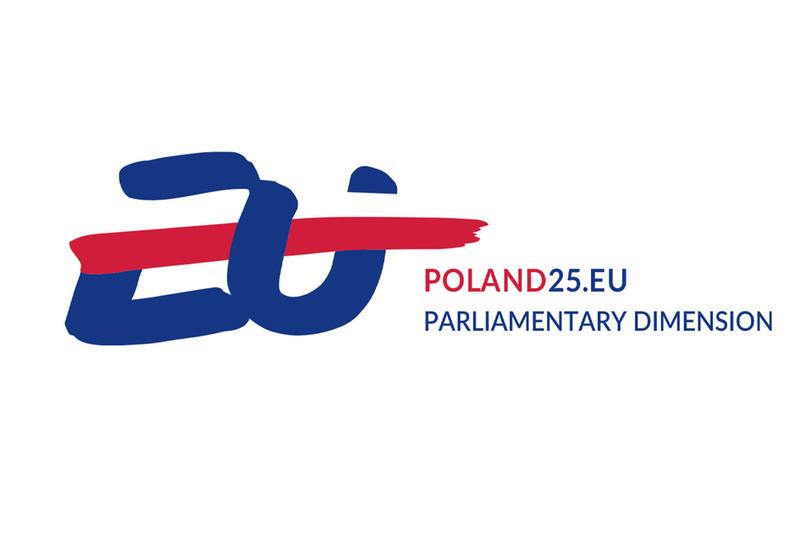19-20.05.2011, BRATYSŁAWA
W spotkaniu uczestniczyli Wicemarszałek Sejmu Ewa Kierzkowska i Marszałek Senatu Bogdan Borusewicz.
PORZĄDEK DZIENNY
- Rozwój infrastruktury w regionie.
- Rozwój infrastruktury w regionie i rozwój turystyki.
FINAL DECLARATION
19-20 May 2011, Bratislava
The 13th Meeting of the Speakers of Parliaments of the Regional Partnership countries extended to the participation of Bulgaria, Croatia and Montenegro, was held in Bratislava on 19 and 20 May 2011 under the chairmanship of the Speaker of the National Council of the Slovak Republic Mr. Richard Sulík.
The meeting was attended by the Deputy Speaker of the Federal Council of the Republic of Austria Ms. Susanne Neuwirth, the Speaker of the Senate of the Czech Republic Mr. Milan Štěch, the Madam Speaker of the Chamber of Deputies of the Czech Republic Ms. Miroslava Němcová, the Deputy Speaker of the National Assembly of the Republic of Hungary Mr. István Jakab, the Deputy Speaker of the Sejm of the Republic of Poland Ms. Ewa Kierzkowska, the Speaker of the Senate of the Republic of Poland Mr. Bogdan Borusewicz, the Speaker of the National Council of the Republic of Slovenia Mr. Blaž Kavčič,
and as invited guests by
the Speaker of the National Assembly of the Republic of Bulgaria Ms. Tsetska Tsacheva, the Speaker of the Parliament of the Republic of Croatia Mr. Luka Bebić and the Speaker of the Parliament of the Republic of Montenegro Mr. Ranko Krivokapić.
The Speakers of the Parliaments of the Regional Partnership countries:
- driven by the endeavour to advance the integration of the European Union also in the fields of tourism, cultural heritage and infrastructure;
- expressing their support to the improvement of the infrastructure with special regard on transport, energy and telecommunications with the enhancement of tourism aimed at creating ample conditions for the regeneration and conservation of a healthy environment;
In accordance with future challenges and trends in transport infrastructure will be needed:
- to modernize and develop transport networks included in TEN-T (railway, road, waterborne and airport infrastructure), mainly projects of European union with status “European interest” in order to remove the existing bottlenecks in infrastructure to release a future potential for future economic and social development;
- to realize projects and measures focused on facilitation of traffic-transport processes between EU and Asia, mainly by better utilising existing rail infrastructure and improving rail connections of Adriatic ports with hinterland;
- to strengthen transport backbone of the region that is north-south corridor connecting the Baltic Sea and Adriatic Sea;
- to realize projects to increase the availability and elimination of regional disparities;
- to ensure integration and interoperability in the individual parts of transport infrastructure as well as an interconnection between different (modal) networks;
- to underscore the need to revitalise important memorials of the past in order to preserve cultural heritage and make it a part of culture and sightseeing activities;
- to support the development of road infrastructure in order to strengthen the position of the Regional Partnership members as transit countries;
- to encourage the development of mutual relations and activities in the field of territorial development by engaging main stakeholders at the national and regional levels in the development of appropriate policies both within and outside the context of the European Union;
- to support, to the maximum extent possible, the creation of Euro-regions between and among the countries of the Regional Partnership as an ample tool for tackling regional problems in the development of infrastructure and tourism;
- to link the prepared projects in tourism and infrastructure with the maximum utilisation of the EU´s Structural Funds.
Due to the actual challenges of the economic and financial crisis, which deserve closer attention of the Regional Partnership´s Speakers of Parliaments and hence increased frequency of their meetings in other forums, the Speakers agreed to hold all future Regional Partnership meetings on a yearly basis, preferably in autumn, starting from the year 2012.
The participants agreed that the 14th Meeting of the Speakers of the Regional Partnership Parliaments would be held in Vienna, in autumn 2012. The date of the Meeting will be specified later on.
Deklaracja końcowa
13. Spotkanie przewodniczących parlamentów
państw Partnerstwa Regionalnego
(Austria, Czechy, Polska, Słowacja, Słowenia, Węgry
+ Bułgaria, Chorwacja oraz Czarnogóra)
19-20 maja 2011 r., Bratysława
13. Spotkanie przewodniczących parlamentów państw Partnerstwa Regionalnego poszerzone o udział Bułgarii, Chorwacji i Czarnogóry, odbyło się w Bratysławie w dniach 19 i 20 maja 2011 r., pod przewodnictwem przewodniczącego Rady Narodowej Republiki Słowackiej Pana Richarda Sulíka.
W spotkaniu wzięli udział: wiceprzewodnicząca Rady Federalnej Republiki Austrii Pani Susanne Neuwirth, przewodniczący Senatu Parlamentu Republiki Czeskiej Pan Milan Štěch, przewodnicząca Izby Deputowanych Parlamentu Republiki Czeskiej Pani Miroslava Němcová, marszałek Senatu RP Pan Bogdan Borusewicz, wicemarszałek Sejmu RP Pani Ewa Kierzkowska, przewodniczący Rady Narodowej Republiki Słowenii Pan Blaž Kavčič, wiceprzewodniczący Zgromadzenia Narodowego Republiki Węgierskiej Pan István Jakab,
oraz zaproszeni goście
przewodnicząca Parlamentu Republiki Bułgarii Pani Tsetska Tsacheva, przewodniczący Parlamentu Chorwacji Pan Luka Bebić oraz przewodniczący Parlamentu Republiki Czarnogóry Pan Ranko Krivokapić.
Przewodniczący parlamentów państw Partnerstwa Regionalnego:
- kierując się dążeniem do zacieśnienia integracji Unii Europejskiej także w obszarze turystyki, dziedzictwa kulturalnego oraz infrastruktury;
- wyrażając swoje poparcie dla poprawy infrastruktury, w szczególności w dziedzinie transportu, energii i telekomunikacji, jak też rozwoju turystyki sprzyjającej regeneracji i ochronie zdrowego środowiska;
W związku z przyszłymi wyzwaniami i trendami w zakresie infrastruktury transportowej trzeba będzie:
- modernizować i rozwijać sieci transportowe w ramach TEN-T (infrastruktura kolejowa, drogowa, dróg wodnych oraz lotniskowa), głównie projekty Unii Europejskiej o statusie „w interesie europejskim” w celu usunięcia wąskich gardeł w infrastrukturze, aby uwolnić przyszły potencjał rozwoju gospodarczego i społecznego;
- realizować projekty oraz podejmować środki ułatwiające transport między UE i Azją, głównie poprzez lepsze wykorzystanie istniejącej infrastruktury kolejowej oraz poprawę połączeń kolejowych portów na wybrzeżu Adriatyku z obszarem w głębi lądu;
- wzmocnić oś transportową regionu, którą stanowi korytarz północ-południe łączący Morze Bałtyckie z Morzem Adriatyckim;
- realizować projekty zwiększające dostępność i eliminujące regionalne nierówności;
- zapewnić integrację i interoperacyjność poszczególnych elementów infrastruktury transportowej, jak również połączenia pomiędzy różnymi (modalnymi) sieciami;
- podkreślić potrzebę rewitalizacji istotnych pomników przeszłości, w celu zachowania dziedzictwa kulturowego tak, aby stały się częścią kultury i były odwiedzane przez turystów;
- wspierać rozwój infrastruktury drogowej w celu wzmocnienia pozycji członków Partnerstwa Regionalnego jako krajów tranzytowych;
- zachęcać do rozwijania wzajemnych stosunków i działań w dziedzinie rozwoju terytorialnego poprzez angażowanie głównych zainteresowanych podmiotów na szczeblu krajowym i regionalnym w rozwój odpowiednich polityk zarówno wewnątrz Unii Europejskiej jak i poza jej granicami;
- wspierać, w możliwie najszerszym zakresie, tworzenie euroregionów pomiędzy krajami Partnerstwa Regionalnego, jako właściwego narzędzia do rozwiązywania problemów regionalnych w rozwoju infrastruktury i turystyki;
- powiązać przygotowywane projekty w zakresie turystyki i infrastruktury z pełnym wykorzystaniem funduszy strukturalnych UE.
Ze względu na realne wyzwania kryzysu gospodarczego i finansowego, które zasługują na większą uwagę ze strony przewodniczących parlamentów Partnerstwa Regionalnego, a tym samym większą częstotliwość ich spotkań w innych gremiach, przewodniczący zgodzili się, aby począwszy od roku 2012, spotkania Partnerstwa Regionalnego odbywały się co roku, najlepiej na jesieni.
Uczestnicy uzgodnili, że 14 Spotkanie Przewodniczących Parlamentów Państw Partnerstwa Regionalnego odbędzie się w Wiedniu jesienią 2012 roku. Data spotkania zostanie sprecyzowana w późniejszym czasie.
Tłum. z jęz. angielskiego: S. Puzyna, BSMUE Kancelarii Senatu


